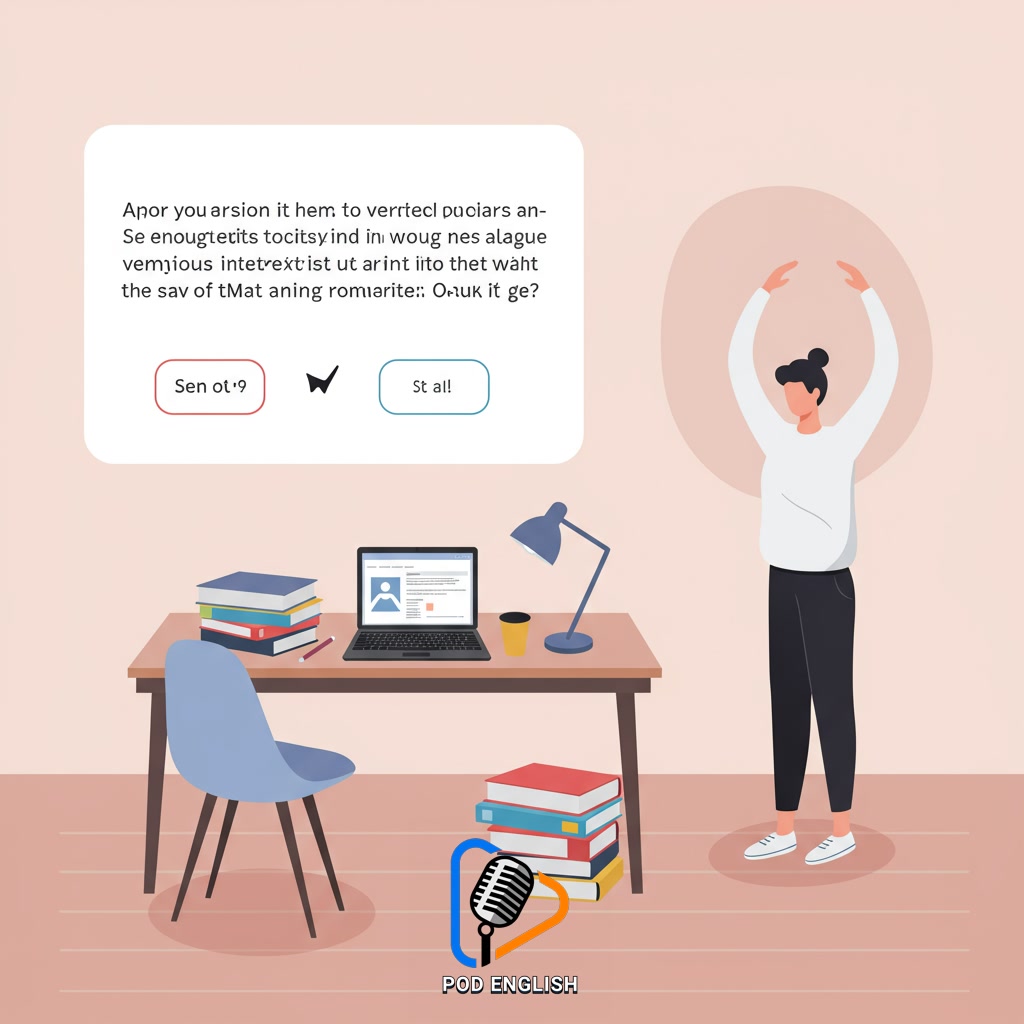Learn English
Sharpen Your English Focus with Exercise

This content explores practical methods to enhance your concentration and effectiveness while learning English. It delves into specific activities and exercises designed to sharpen your focus and improve retention of language concepts. The aim is to provide actionable techniques that directly contribute to successful language acquisition through dedicated practice.
Table of Contents
- Section 1: Introduction: The Challenge of Focus in English Learning
- Section 2: The Science Behind Exercise and Brain Function
- Section 3: Types of Exercise for Enhanced Cognitive Focus
- Section 4: Practical Ways to Integrate Exercise into Your Study Routine
- Section 5: Maximizing Focus: Combining Physical Activity with English Practice
- Section 6: Conclusion: Achieve Better Focus, Accelerate Learning
Section 1: Introduction: The Challenge of Focus in English Learning
Learning English is a journey that requires consistent effort and, crucially, sustained focus. Many learners find maintaining concentration to be one of the most significant hurdles. In an age filled with constant digital notifications, environmental distractions, and the natural tendency for our minds to wander, staying fully engaged with grammar rules, vocabulary lists, or listening exercises can be incredibly challenging. This lack of focused attention often leads to slower progress, difficulty retaining new information, and a feeling of being overwhelmed or stuck. Recognizing this common struggle is the first step towards finding effective strategies to sharpen your mental clarity and make your English learning sessions more productive and rewarding.

Introduction: The Challenge of Focus in English Learning
Section 2: The Science Behind Exercise and Brain Function
Exercise isn’t just good for your body; it significantly impacts your brain, which is vital for learning English. When you exercise, your heart pumps more blood, increasing circulation to the brain. This delivers essential oxygen and nutrients, literally fueling brain cells. Physical activity also triggers the release of powerful chemicals like endorphins, dopamine, and BDNF. Endorphins reduce stress and improve mood, creating a better mental state for learning. Dopamine enhances motivation and attention. BDNF is like fertilizer for the brain, supporting the growth of new neurons and strengthening connections between them, especially in areas responsible for memory, focus, and cognitive function. This improved neural health directly translates to a sharper ability to concentrate on complex tasks, like grasping new English grammar or vocabulary, making your study sessions more effective.

The Science Behind Exercise and Brain Function
Section 3: Types of Exercise for Enhanced Cognitive Focus
Building on the connection between physical activity and brain health, certain types of exercise are particularly effective for boosting cognitive functions essential for learning, such as focus and concentration. Aerobic exercises like running, swimming, or cycling increase blood flow and oxygen to the brain, which can sharpen attention and improve memory retention. Strength training, while seemingly unrelated, also has positive effects on cognitive function, helping to regulate mood and energy levels, which are crucial for sustained focus. Mind-body practices such as yoga or Tai Chi are excellent for enhancing concentration and reducing stress through controlled breathing and movement, directly training your ability to focus and filter distractions – a valuable skill when tackling complex English grammar or vocabulary.

Types of Exercise for Enhanced Cognitive Focus
Section 4: Practical Ways to Integrate Exercise into Your Study Routine
Building on the understanding that exercise enhances cognitive function, let’s explore practical ways to weave physical activity into your English study routine. Integrating short bursts of movement can significantly boost focus. Consider simple actions like standing up to stretch every 30-45 minutes, taking a brisk 5-minute walk around your home or study area during a break, or doing a few jumping jacks or push-ups. Even incorporating a longer exercise session, like a jog or gym visit, before or after your study period can prime your brain for learning or help solidify what you’ve just absorbed. These small additions aren’t distractions; they are active steps to refresh your mind, improve blood flow, and enhance your ability to concentrate on challenging English grammar or vocabulary, making your study time more effective and productive.

Practical Ways to Integrate Exercise into Your Study Routine
Section 5: Maximizing Focus: Combining Physical Activity with English Practice
To truly maximize focus while learning English, the key lies in strategically combining physical activity with your study sessions. Instead of viewing exercise and study as separate tasks, look for opportunities to blend them. For instance, listen to English podcasts or audiobooks during your walk or run. Review vocabulary flashcards during short breaks between exercise sets. Practice speaking English sentences aloud while doing light stretching or cycling indoors. This integration not only keeps your body active but also leverages the enhanced blood flow and alertness from physical activity to potentially improve retention and concentration on the English material. Finding ways to multitask smartly like this can make your learning process more dynamic and effective for learning english.

Maximizing Focus: Combining Physical Activity with English Practice
Section 6: Conclusion: Achieve Better Focus, Accelerate Learning
This exploration has highlighted the powerful link between physical activity and cognitive function, specifically focus. By integrating movement into your routine, you actively cultivate the mental clarity needed for effective English study. A focused mind is more receptive to new vocabulary, grammar structures, and listening nuances. This enhanced absorption and retention directly accelerate your progress towards fluency. Consider this a call to action: make exercise a non-negotiable part of your English learning strategy. The result will be not just improved focus, but a noticeably faster and more rewarding path to mastering the language.

Conclusion: Achieve Better Focus, Accelerate Learning













